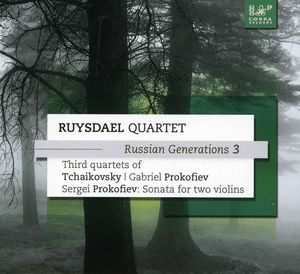Show results for
Deals
- Blu-ray Outlet
- New Release 4K
- New Release Blu-ray
- New Release DVD
- New Release Gifts
- New Release Music
- New Release Vinyl
- Top Seller 4K
- Top Seller Blu ray
- Top Seller DVD
- Top Seller Vinyl
- top sellers all movies
- top sellers all music
- Top Selling Gifts
- TV Outlet
- Top Seller Music
- DVD Outlet
- In Stock Outlet
- Music Outlet

Russian Generations 3
- (Digipack Packaging)
- Format: CD
- Release Date: 08/05/2012

Russian Generations 3
(Digipack Packaging)
- Artist: Ruysdael Quartet
- Label: Cobra Records
- Genre: Classical
- UPC: 8713897902624
Product Notes
String Quartet No. 3 in E? minor Op. 30 (1876) Pyotr Ilyich Tchaikovsky I Andante sostenuto - Allegro moderato II Allegretto vivo e scherzando III Andante funebre e doloroso, ma con moto IV Finale. Allegro non troppo e risoluto In 1876 at the age of thirty-five Tchaikovsky enjoyed a brief but inspiring trip from his native city of Moscow to visit Modest, his brother, in Paris. On the 20th January the composer saw one of the final performances of the first production of Bizet's Carmen. It had a profound effect on him and he was to later describe it as "perhaps the most outstanding operatic work of our age." During his time in Paris, Tchaikovsky was beginning work on his third and final string quartet. Perhaps due to his rapture at seeing Carmen, the quartet appears to have sprung from one of Tchaikovsky's less depressive periods. However the impetus for writing the work was the death of his friend the Czech violinist and composer Ferdinand Laub who was also a colleague at the Moscow Conservatory. Laub had been the first violinist in the premiere performances of the composer's first (1871) and second (1874) string quartets, so it seems only fitting that Tchaikovsky dedicated the work to his memory. Tchaikovsky completed the work in less than two months whereupon it received a number of performances, the first being a private performance on 14th March 1876 at one of Nikolai Rubinstein's soirées. The next day, during a bout of self-doubt, Tchaikovsky wrote to Modest "I think I'm all written out" and accused himself of rewriting the same ideas. The work is both brooding and elegiac and hailed by academics as an equal, if not a superior, of the two earlier quartets. Tchaikovsky had already demonstrated his assured mastery of the medium in the previous two works and in the third quartet only need expand on the expressive and communicative qualities that were already hallmarks of his compositional style. His abundance of creative ideas are tightly packed into the traditional four-movement structure and occasionally push the form to breaking point. Written in the key of E-flat minor, which has six out of the seven notes of the scale flattened, this has a particular effect on the resonance of the instruments. With no opportunities to play with open-strings there are fewer overtones giving the piece a more muffled and subdued sound world. It is the first movement that stretches the boundaries furthest with a complex structure and demanding, emotional outpouring. From the outset the intense and anguished introduction alternates duplets and triplets anticipating the main musical material of the movement. Whilst the first violin takes a clear lead the viola and 'cello also play prominent roles in providing contrary musical ideas. Unusually, the Allegro begins with a three-beat pulse (3/4) but rarely succumbs to any feeling of waltz as Tchaikovsky compounds rhythmic ideas. Favouring a hemiola effect, at the height of the developmental section this is pitted against syncopation, triplets and dotted rhythms in complete contrast to the moments of rhythmical unity.


